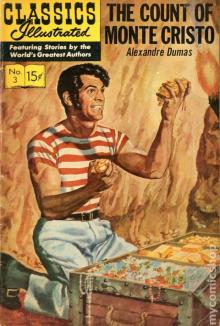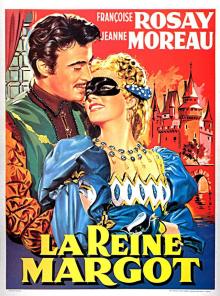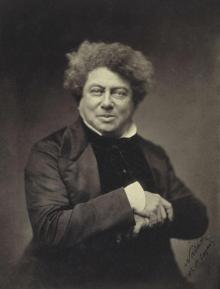- Home
- Alexandre Dumas
Three Musketeers (Barnes & Noble Classics Series) Page 16
Three Musketeers (Barnes & Noble Classics Series) Read online
Page 16
“Your affair is not bad,” said Athos, after having tasted like a connoisseur and indicated by a nod of his head that he thought the wine good; “and one may draw fifty or sixty pistoles from this good man. Then there only remains to ascertain whether these fifty or sixty pistoles are worth the risk of four heads.”
“But observe,” cried D’Artagnan, “that there is a woman in the affair—a woman carried off, a woman who is doubtless threatened, tortured perhaps, and all because she is faithful to her mistress.”
“Beware, D’Artagnan, beware,” said Aramis. “You grow a little too warm, in my opinion, about the fate of Madame Bonacieux. Woman was created for our destruction, and it is from her we inherit all our miseries.”
At this speech of Aramis, the brow of Athos became clouded and he bit his lips.
“It is not Madame Bonacieux about whom I am anxious,” cried D’Artagnan, “but the queen, whom the king abandons, whom the cardinal persecutes, and who sees the heads of all her friends fall, one after the other.”
“Why does she love what we hate most in the world, the Spaniards and the English?”
“Spain is her country,” replied D’Artagnan; “and it is very natural that she should love the Spanish, who are the children of the same soil as herself. As to the second reproach, I have heard it said that she does not love the English, but an Englishman.”
“Well, and by my faith,” said Athos, “it must be acknowledged that this Englishman is worthy of being loved. I never saw a man with a nobler air than his.”
“Without reckoning that he dresses as nobody else can,” said Porthos. “I was at the Louvre on the day when he scattered his pearls;16 and, pardieu, I picked up two that I sold for ten pistoles each. Do you know him, Aramis?”
“As well as you do, gentlemen; for I was among those who seized him in the garden at Amiens, into which Monsieur Putange, the queen’s equerry, introduced me.17 I was at school at the time, and the adventure appeared to me to be cruel for the king.”
“Which would not prevent me,” said D’Artagnan, “if I knew where the Duke of Buckingham was, from taking him by the hand and conducting him to the queen, were it only to enrage the cardinal. For our true, our only, our eternal enemy, gentlemen, is the cardinal, and if we could find means to play him a sharp turn, I vow that I would voluntarily risk my head in doing it.”
“And did the mercer, ”prejoined Athos, “tell you, D’Artagnan, that the queen thought that Buckingham had been brought over by a forged letter?”
“She is afraid so.”
“Wait a minute, then,” said Aramis.
“What for?” demanded Porthos.
“Go on, while I endeavor to recall certain circumstances.”
“And now I am convinced,” said D’Artagnan, “that this abduction of the queen’s woman is connected with the events of which we are speaking, and perhaps with the presence of Buckingham in Paris.”
“The Gascon is full of ideas,” said Porthos, with admiration.
“I like to hear him talk,” said Athos; “his dialect amuses me.”
“Gentlemen,” cried Aramis, “listen to this.”
“Listen to Aramis,” said his three friends.
“Yesterday I was at the house of a doctor of theology, whom I sometimes consult about my studies.”
Athos smiled.
“He resides in a quiet quarter,” continued Aramis; “his tastes and his profession require it. Now, at the moment when I left his house—”
Here Aramis paused.
“Well,” cried his auditors; “at the moment you left his house?”
Aramis appeared to make a strong inward effort, like a man who, in the full relation of a falsehood, finds himself stopped by some unforeseen obstacle; but the eyes of his three companions were fixed upon him, their ears were wide open, and there were no means of retreat.
“This doctor has a niece,” continued Aramis.
“Ah, he has a niece!” interrupted Porthos.
“A very respectable lady,” said Aramis.
The three friends burst into laughter.
“Ah, if you laugh, if you doubt me,” replied Amaris, “you shall know nothing.”
“We believe like Mohammedans, and are as mute as tomb-stones,” said Athos.
“I will continue, then,” resumed Aramis. “This niece comes sometimes to see her uncle; and by chance was there yesterday at the same time that I was, and it was my duty to offer to conduct her to her carriage.”
“Ah! She has a carriage, then, this niece of the doctor?” interrupted Porthos, one of whose faults was a great looseness of tongue. “A nice acquaintance, my friend!”
“Porthos,” replied Aramis, “I have had the occasion to observe to you more than once that you are very indiscreet; and that is injurious to you among the women.”
“Gentlemen, gentlemen,” cried D’Artagnan, who began to get a glimpse of the result of the adventure, “the thing is serious. Let us try not to jest, if we can. Go on Aramis, go on.”
“All at once, a tall, dark gentleman—just like yours, D’Artagnan.”
“The same, perhaps,” said he.
“Possibly,” continued Aramis, “came toward me, accompanied by five or six men who followed about ten paces behind him; and in the politest tone, ‘Monsieur Duke,’ said he to me, ‘and you madame,’ continued he, addressing the lady on my arm—”
“The doctor’s niece?”
“Hold your tongue, Porthos,” said Athos; “you are insupportable.”
“ ‘—will you enter this carriage, and that without offering the least resistance, without making the least noise?’ ”
“He took you for Buckingham!” cried D’Artagnan.
“I believe so,” replied Aramis.
“But the lady?” asked Porthos.
“He took her for the queen!” said D’Artagnan.
“Just so,” replied Aramis.
“The Gascon is the devil!” cried Athos; “nothing escapes him.”
“The fact is,” said Porthos, “Aramis is of the same height, and something of the shape of the duke; but it nevertheless appears to me that the dress of a Musketeer—”
“I wore an enormous cloak,” said Aramis.
“In the month of July? the devil!” said Porthos. “Is the doctor afraid that you may be recognized?”
“I can comprehend that the spy may have been deceived by the person; but the face—”
“I had a large hat,” said Aramis.
“Oh, good Lord,” cried Porthos, “what precautions for the study of theology! ”
“Gentlemen, gentlemen,” said D’Artagnan, “do not let us lose our time in jesting. Let us separate, and let us seek the mercer’s wife—that is the key of the intrigue.”
“A woman of such inferior condition! Can you believe so?” said Porthos, protruding his lips with contempt.
“She is goddaughter to Laporte, the confidential valet of the queen. Have I not told you so, gentlemen? Besides, it has perhaps been her Majesty’s calculation to seek on this occasion for support so lowly. High heads expose themselves from afar, and the cardinal is longsighted.”
“Well,” said Porthos, “in the first place make a bargain with the mercer, and a good bargain.”
“That’s useless,” said D’Artagnan; “for I believe if he does not pay us, we shall be well enough paid by another party.”
At this moment a sudden noise of footsteps was heard upon the stairs; the door was thrown violently open, and the unfortunate mercer rushed into the chamber in which the council was held.
“Save me, gentlemen, for the love of heaven, save me!” cried he. “There are four men come to arrest me. Save me! save me!”
Porthos and Aramis arose.
“A moment,” cried D’Artagnan, making them a sign to replace in the scabbard their half-drawn swords. “It is not courage that is needed; it is prudence.”
“And yet,” cried Porthos, “we will not leave—”
“You will leav
e D‘Artagnan to act as he thinks proper,” said Athos. “He has, I repeat, the longest head of the four, and for my part I declare that I will obey him. Do as you think best, D’Artagnan.”
At this moment the four Guards appeared at the door of the antechamber, but seeing four Musketeers standing, and their swords by their sides, they hesitated about going farther.
“Come in, gentlemen, come in,” called D’Artagnan; “you are here in my apartment, and we are all faithful servants of the king and cardinal.”
“Then, gentlemen, you will not oppose our executing the orders we have received?” asked one who appeared to be the leader of the party.
“On the contrary, gentlemen, we would assist you if it were necessary.”
“What does he say?” grumbled Porthos.
“You are a simpleton,” said Athos. “Silence!”
“But you promised me—” whispered the poor mercer.
“We can only save you by being free ourselves,” replied D’Artagnan, in a rapid, low tone; “and if we appear inclined to defend you, they will arrest us with you.”
“It seems, nevertheless—”
“Come, gentlemen, come!” said D’Artagnan, aloud; “I have no motive for defending Monsieur. I saw him today for the first time, and he can tell you on what occasion; he came to demand the rent of my lodging. Is not that true, Monsieur Bonacieux ? Answer!”
“That is the very truth,” cried the mercer; “but Monsieur does not tell you—”
“Silence, with respect to me; silence, with respect to my friends; silence about the queen, above all, or you will ruin everybody without saving yourself! Come, come, gentlemen, remove the fellow.” And D’Artagnan pushed the half-stupefied mercer among the Guards, saying to him, “You are a shabby old fellow, my dear. You come to demand money of me—of a Musketeer! To prison with him! Gentlemen, once more, take him to prison, and keep him under key as long as possible; that will give me time to pay him.”
The officers were full of thanks, and took away their prey. As they were going down D’Artagnan laid his hand on the shoulder of their leader.
“May I not drink to your health, and you to mine?” said D’Artagnan, filling two glasses with the Beaugency wine which he had obtained from the liberality of M. Bonacieux.
“That will do me great honor,” said the leader of the posse, “and I accept thankfully.”
“Then to yours, monsieur—what is your name?”
“Boisrenard.”
“Monsieur Boisrenard.”
“To yours, my gentleman! What is your name, in your turn, if you please?”
“D’Artagnan.”
“To yours, monsieur.”
“And above all others,” cried D’Artagnan, as if carried away by his enthusiasm, “to that of the king and the cardinal.”
The leader of the posse would perhaps have doubted the sincerity of D’Artagnan if the wine had been bad; but the wine was good, and he was convinced.
“What diabolical villainy you have performed here,” said Porthos, when the officer had rejoined his companions and the four friends found themselves alone. “Shame, shame, for four Musketeers to allow an unfortunate fellow who cried for help to be arrested in their midst! And a gentleman to hobnob with a bailiff!”
“Porthos,” said Aramis, “Athos has already told you that you are a simpleton, and I am quite of his opinion. D’Artagnan, you are a great man; and when you occupy Monsieur de Treville’s place, I will come and ask your influence to secure me an abbey.”
“Well, I am in a maze,” said Porthos; “do you approve of what D’Artagnan has done?”
“Parbleu! indeed I do,” said Athos; “I not only approve of what he has done, but I congratulate him upon it.”
“And now, gentlemen,” said D’Artagnan, without stopping to explain his conduct to Porthos, “All for one, one for all—that is our motto, is it not?”
“And yet—” said Porthos. “Hold out your hand and swear!” cried Athos and Aramis at once.
Overcome by example, grumbling to himself, nevertheless, Porthos stretched out his hand, and the four friends repeated with one voice the formula dictated by D’Artagnan:
“All for one, one for all.”
“That’s well! Now let everyone retire to his own home,” said D’Artagnan, as if he had done nothing but command all his life; “and attention! for from this moment we are at feud with the cardinal.”
10
A MOUSETRAP IN THE SEVENTEENTH CENTURY
The invention of the mousetrap does not date from our days; as soon as societies, in forming, had invented any kind of police, that police invented mousetraps.
As perhaps our readers are not familiar with the slang of the Rue de Jerusalem, and as it is fifteen years since we applied this word for the first time to this thing, allow us to explain to them what is a mousetrap.
When in a house, of whatever kind it may be, an individual suspected of any crime is arrested, the arrest is held secret. Four or five men are placed in ambuscade in the first room. The door is opened to all who knock. It is closed after them, and they are arrested; so that at the end of two or three days they have in their power almost all the habitués of the establishment. And that is a mousetrap.
The apartment of M. Bonacieux, then, became a mousetrap ; and whoever appeared there was taken and interrogated by the cardinal’s people. It must be observed that as a separate passage led to the first floor, in which D’Artagnan lodged, those who called on him were exempted from this detention.
Besides, nobody came thither but the three Musketeers; they had all been engaged in earnest search and inquiries, but had discovered nothing. Athos had even gone so far as to question M. de Treville—a thing which, considering the habitual reticence of the worthy Musketeer, had very much astonished his captain. But M. de Tréville knew nothing, except that the last time he had seen the cardinal, the king, and the queen, the cardinal looked very thoughtful, the king uneasy, and the redness of the queen’s eyes donated that she had been sleepless or tearful. But this last circumstance was not striking, as the queen since her marriage had slept badly and wept much.
M. de Tréville requested Athos, whatever might happen, to be observant of his duty to the king, but particularly to the queen, begging him to convey his desires to his comrades.
As to D’Artagnan, he did not budge from his apartment. He converted his chamber into an observatory. From his windows he saw all the visitors who were caught. Then, having removed a plank from his floor, and nothing remaining but a simple ceiling between him and the room beneath, in which the interrogatories were made, he heard all that passed between the inquisitors and the accused.
The interrogatories, preceded by a minute search operated upon the persons arrested, were almost always framed thus: “Has Madame Bonacieux sent anything to you for her husband, or any other person? Has Monsieur Bonacieux sent any thing to you for his wife, or for any other person? Has either of them confided anything to you by word of mouth?”
“If they knew anything, they would not question people in this manner,” said D’Artagnan to himself. “Now, what is it they want to know? Why, they want to know if the Duke of Buckingham is in Paris, and if he has had, or is likely to have, an interview with the queen.”
D’Artagnan held onto this idea, which, from what he heard, was not wanting in probability.
In the meantime, the mousetrap continued in operation, and likewise D’Artagnan’s vigilance.
On the evening of the day after the arrest of poor Bonacieux, as Athos had just left D‘Artagnan to report at M. de Tréville’s, as nine o’clock had just struck, and as Planchet, who had not yet made the bed, was beginning his task, a knocking was heard at the street door. The door was instantly opened and shut; someone was taken in the mousetrap.
D’Artagnan flew to his hole, laid himself down on the floor at full length, and listened.
Cries were soon heard, and then moans, which someone appeared to be endeavoring to stifle. There were
no questions.
“The devil!” said D’Artagnan to himself. “It seems like a woman! They search her; she resists; they use force—the scoundrels!”
In spite of his prudence, D’Artagnan restrained himself with great difficulty from taking a part in the scene that was going on below.
“But I tell you that I am the mistress of the house, gentlemen! I tell you I am Madame Bonacieux; I tell you I belong to the queen!” cried the unfortunate woman.
“Madame Bonacieuxl” murmured D’Artagnan. “Can I be so lucky as to find what everybody is seeking for?”
The voice became more and more indistinct; a tumultuous movement shook the partition. The victim resisted as much as a woman could resist four men.
“Pardon, gentlemen—par—” murmured the voice, which could now be only heard in inarticulate sounds.
“They are binding her; they are going to drag her away,” cried D’Artagnan to himself, springing up from the floor. “My sword! good, it is by my side! Planchet!”
“Monsieur.”
“Run and seek Athos, Porthos, and Aramis. One of the three will certainly be at home, perhaps all three. Tell them to take arms, to come here, and to run! Ah, I remember, Athos is at Monsieur de Tréville’s.”
“But where are you going, monsieur, where are you going?”
“I am going down by the window, in order to be there the sooner,” cried D’Artagnan. “You put back the boards, sweep the floor, go out at the door, and run as I told you.”
“Oh, monsieur! monsieur! you will kill yourself,” cried Planchet.
“Hold your tongue, stupid fellow,” said D’Artagnan; and laying hold of the casement, he let himself gently down from the first story, which fortunately was not very elevated, without doing himself the slightest injury.
He then went straight to the door and knocked, murmuring, “I will go myself and be caught in the mousetrap, but woe be to the cats that shall pounce upon such a mouse!”
The knocker had scarcely sounded under the hand of the young man before the tumult ceased, steps approached, the door was opened, and D’Artagnan, sword in hand, rushed into the rooms of M. Bonacieux, the door of which, doubtless acted upon by a spring, closed after him.

 The Count of Monte Cristo, Illustrated
The Count of Monte Cristo, Illustrated Knight of Maison-Rouge
Knight of Maison-Rouge![The Three Musketeers - Alexandre Dumas - [Full Version] - (ANNOTATED) Read online](http://i1.bookreadfree.com/14/the_three_musketeers_-_alexandre_dumas_-_[full_version]_-_annotated_preview.jpg) The Three Musketeers - Alexandre Dumas - [Full Version] - (ANNOTATED)
The Three Musketeers - Alexandre Dumas - [Full Version] - (ANNOTATED) The Man in the Iron Mask
The Man in the Iron Mask The Count of Monte Cristo (Penguin Classics eBook)
The Count of Monte Cristo (Penguin Classics eBook) Count of Monte Cristo (abridged) (Barnes & Noble Classics Series)
Count of Monte Cristo (abridged) (Barnes & Noble Classics Series) The Women's War
The Women's War La reine Margot. English
La reine Margot. English The Vicomte de Bragelonne
The Vicomte de Bragelonne__english_preview.jpg) La dame aux camélias (Novel). English
La dame aux camélias (Novel). English The Count of Monte Cristo
The Count of Monte Cristo Balsamo, the Magician; or, The Memoirs of a Physician
Balsamo, the Magician; or, The Memoirs of a Physician Ten Years Later
Ten Years Later The Romance of Violette
The Romance of Violette The Mesmerist's Victim
The Mesmerist's Victim Vingt ans après. English
Vingt ans après. English Le collier de la reine. English
Le collier de la reine. English Taking the Bastile; Or, Pitou the Peasant
Taking the Bastile; Or, Pitou the Peasant The Hero of the People: A Historical Romance of Love, Liberty and Loyalty
The Hero of the People: A Historical Romance of Love, Liberty and Loyalty Louise de la Valliere
Louise de la Valliere Les Quarante-cinq. English
Les Quarante-cinq. English Ange Pitou (Volume 1)
Ange Pitou (Volume 1) The Royal Life Guard; or, the flight of the royal family.
The Royal Life Guard; or, the flight of the royal family. Les trois mousquetaires. English
Les trois mousquetaires. English Une fille du régent. English
Une fille du régent. English The Knight of Maison-Rouge
The Knight of Maison-Rouge The Count of Monte Cristo (Unabridged Penguin)
The Count of Monte Cristo (Unabridged Penguin) Ange Pitou
Ange Pitou The Romance of Violette (vintage erotica)
The Romance of Violette (vintage erotica) The Three Musketeers
The Three Musketeers Three Musketeers (Barnes & Noble Classics Series)
Three Musketeers (Barnes & Noble Classics Series) Georges
Georges Man in the Iron Mask (Barnes & Noble Classics Series)
Man in the Iron Mask (Barnes & Noble Classics Series) The Red Sphinx
The Red Sphinx